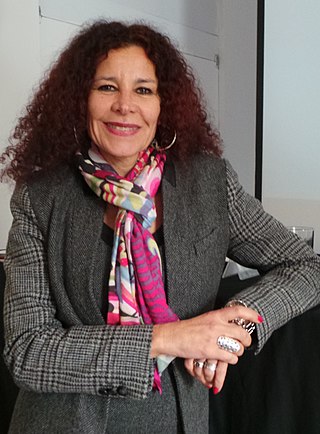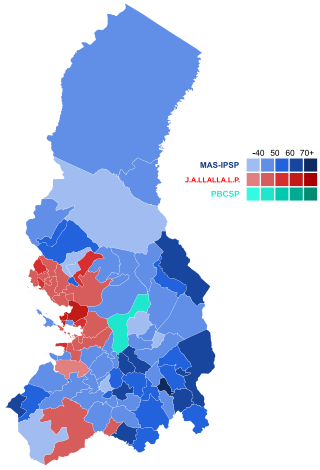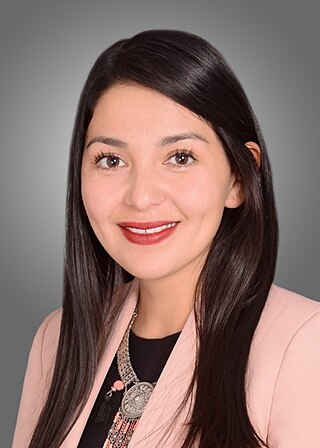
Elizabeth Cristina Salguero Carrillo is a Bolivian diplomat, journalist, politician, and women's rights activist who served as minister of cultures from 2011 to 2012. A member of the Movement for Socialism, she previously served as a party-list member of the Chamber of Deputies from La Paz from 2006 to 2009. In 2009, she was elected as a substitute party-list member of the Chamber of Deputies from La Paz but resigned before taking office in order to launch an ultimately unsuccessful La Paz mayoral campaign. From 2012 to 2015, she served as ambassador of Bolivia to Germany, and since then has worked as an international expert in strategic planning at UN Women.

Adriana Salvatierra Arriaza is a Bolivian political scientist and politician who served as president of the Senate in 2019. A member of the Movement for Socialism, she served as senator for Santa Cruz from 2015 to 2020 and was a substitute senator for Santa Cruz under Carlos Romero in 2015. At age twenty-nine, Salvatierra was the youngest legislator and third woman to hold the presidency of the Senate and was the youngest individual to ever exert presidential authority, albeit briefly in an acting capacity.

Jeanine Áñez Chávez is a Bolivian lawyer, politician, and television presenter who served as the 66th president of Bolivia from 2019 to 2020. A former member of the Social Democratic Movement, she previously served two terms as senator for Beni from 2015 to 2019 on behalf of the Democratic Unity coalition and from 2010 to 2014 on behalf of the National Convergence alliance. During this time, she served as second vice president of the Senate from 2015 to 2016 and in 2019 and, briefly, was president of the Senate, also in 2019. Before that, she served as a uninominal member of the Constituent Assembly from Beni, representing circumscription 61 from 2006 to 2007 on behalf of the Social Democratic Power alliance.

Centa Lothy Rek López is a Bolivian novelist, politician, and psychoanalyst who served as senator for Santa Cruz from 2010 to 2015 and since 2020.
Events from the year 2022 in Bolivia.

The Ombudsman's Office of Bolivia is an independent governmental institution established by the Constitution, charged with overseeing the fulfillment, protection, and promotion of human rights in the country. The Ombudsman's Office is functionally, financially, and administratively independent of the four branches of Bolivian government. It was established on 22 December 1997 by Law N° 1818, and is currently regulated by Law N° 870 of 13 December 2016. Governance scholar Tom Pegram writes that "the Bolivian Ombudsman's Office has been recognized as arguably the most effective state actor in terms of advancing rights and active citizenship".

Betty Asunta Tejada Soruco is a Bolivian ecologist, lawyer, and politician who served as president of the Chamber of Deputies from 2013 to 2014. A member of the Movement for Socialism, she served as party-list member of the Chamber of Deputies from Santa Cruz from 2010 to 2015. Prior to that, she served in the same position from 2002 to 2006 and as a substitute party-list member of the Chamber of Deputies from Santa Cruz under Roberto Landívar from 1997 to 2002, on behalf of the right-wing populist New Republican Force.

The 2022 Bolivian ombudsman election took place between 15 March and 23 September 2022 during the term of the 3rd Plurinational Legislative Assembly. This unusual intra-term election for ombudsman of Bolivia was necessitated by the resignation of David Tezanos Pinto on 24 January 2019, leaving Nadia Cruz as the acting authority for more than three years, even exceeding the expiration of Tezanos Pinto's originally set six-year term. This was the sixth ombudsman election since the office was created in 1997. Constitutional lawyer Pedro Callisaya won the contest, receiving ninety-five votes, a two-thirds majority of those present but not of the total membership of both legislative chambers. Callisaya's election was supported only by the ruling Movement for Socialism, while the two opposition blocs boycotted the vote.
The following is a list of events in the year 1982 in Bolivia.

Martha Yujra Apaza is a Bolivian politician and trade unionist who served as minister of cultures and tourism from 2019 to 2020. A prominent trade union leader in El Alto, Yujra was the only indigenous member of the Jeanine Áñez Cabinet and was the final official to head the Ministry of Cultures and Tourism; the institution was abolished during her term. During her tenure, Yujra's office primarily dealt with the effects of the COVID-19 pandemic on the cultural sector, devising means of alleviating the economic ramifications of quarantine measures on artisans and entertainers. She subsequently served as a counselor at the Embassy of Bolivia in Quito from July to November 2020. Prior to serving as minister, Yujra gained notoriety for her fierce opposition to the government of Evo Morales. In 2017, she led a breakaway faction of the pro-government El Alto Regional Workers' Center. As its executive secretary, Yujra aligned the union with the Bolivia Says No alliance, running unsuccessfully to represent La Paz in the Chamber of Deputies in the annulled 2019 general elections.

María Elva Pinckert Vaca is a Bolivian businesswoman, lawyer, and politician who served as minister of environment and water from 2019 to 2020. Pinckert developed her career in Santa Cruz's agro-industrial heartland, during which time she rose to key positions of regional economic and political influence, including presiding over the Montero Civic Committee and serving as vice president of the Santa Cruz Chamber of Industry and Commerce. Elected to the Montero Municipal Council as a member of the Revolutionary Nationalist Movement in 1999, Pinckert later switched to the New Republican Force, with which she won reelection. In 2009, the party promoted her to the Senate as a substitute senator under Germán Antelo. Amid the disunity brought about by the fragmentation of her parliamentary caucus, Pinckert aligned with the Social Democratic Movement, which nominated her for a full Senate seat. Elected in 2014, Pinckert held office until 2019, when she joined the Áñez administration as head of environmental and water policy. As with many former Áñez ministers, Pinckert faced judicial consequences for her collaboration with the transitional government, leading her to seek refuge in Brazil less than a year after leaving office.
The 2021 La Paz municipal election was held in La Paz, Bolivia on Sunday, 7 March 2021, involving separate contests for mayor and all eleven municipal council seats. Incumbent mayor Luis Revilla was eligible to seek a third term but declined, leaving the mayoralty an open contest. The election was won by former minister of public works Iván Arias of the alliance, who attained a near absolute majority of 49.52 percent against a field of ten other candidates. On the municipal ballot, Somos Pueblo won 48.04 percent of the vote, winning the six seats needed to exercise a simple majority on the municipal council, with the Movement for Socialism taking the remaining five seats. Revilla's party, Sovereignty and Liberty, lost both the mayoralty and all representation on the municipal council, concluding a twenty-year period of political continuity that started in 2000 with the assumption of Juan del Granado.

The 2021 La Paz gubernatorial election was held on Sunday, 7 March 2021, with a runoff taking place on 11 April 2021, involving separate contests for governor and all forty-five seats in the Departmental Legislative Assembly. Incumbent governor Félix Patzi unsuccessfully sought reelection to a second term, finishing in fourth place with 4.36 percent of the popular vote. The election was won by Jallalla La Paz's Santos Quispe, who attained 55.23 percent of the vote in the second round, defeating Franklin Flores of the Movement for Socialism. On the legislative ballot, the Movement for Socialism won sixteen of the twenty provincial circumscriptions and nine of the twenty party-list seats, retaining its twenty-five seat majority in the Legislative Assembly.

Freddy Mamani Laura is a Bolivian educator, politician, and trade unionist who served as president of the Chamber of Deputies from 2020 to 2022. A member of the Movement for Socialism, he has served as a party-list member of the Chamber of Deputies from La Paz since 2020. He previously served as executive secretary of the National Confederation of Rural Teachers of Bolivia and as departmental executive of the Federation of Rural Teachers of La Paz. Prior to entering politics, Mamani worked as a teacher, serving as the principal of various rural schools in the department.

Rebeca Elvira Delgado Burgoa is a Bolivian academic, lawyer, magistrate, and politician who served as president of the Chamber of Deputies from 2012 to 2013. As a member of the Movement for Socialism, she served as a party-list member of the Chamber of Deputies from Cochabamba from 2010 to 2014. Prior to her election to the lower chamber, Delgado served as a party-list member of the Constituent Assembly from Cochabamba from 2006 to 2007 and was vice minister of government coordination from 2008 to 2009. Delgado's near-decade-long political and legislative tenure was preceded by a fifteen-year career as a public servant, during which time she worked as a public defender and examining magistrate, was a magistrate on the Departmental Electoral Court of Cochabamba, and served as the Ombudsman's Office's delegate for the fight against corruption in Cochabamba.

Romina Guadalupe Pérez Ramos is a Bolivian academic, diplomat, politician, and sociologist who served as ambassador of Bolivia to Iran from 2019 to 2020 and since 2021. A member of the Movement for Socialism, she previously served as a party-list member of the Chamber of Deputies from Cochabamba from 2015 to 2019. Pérez graduated as a sociologist from the Higher University of San Simón before completing postgraduate studies in the European Union. She comes from a generation of leftist academics who entered political activity as activists against the military dictatorships of the 1970s and 80s, as well as the neoliberal democratic governments that succeeded them. Her work in the field of women's and ethnic rights led her to join multiple NGOs, including the Center for Legal Studies and Social Research, through which many academics and intellectuals became politically linked with the Movement for Socialism. In 2014, she won a seat in the Chamber of Deputies on the party's electoral list but did not complete her term, being appointed ambassador to Iran in mid-2019.

Pedro Francisco Callisaya Aro is a Bolivian academic, constitutional lawyer, and jurist serving as the sixth ombudsman of Bolivia since 2022. Callisaya developed his career in academic circles, completing multiple graduate and postgraduate courses in the fields of constitutional law and human rights. After exercising a couple of minor public posts in the late 1990s, Callisaya entered the Ombudsman's Office, where he worked for over a decade. He served for two terms on the Departmental Court of Justice of La Paz from 2012 to 2016 and 2017 to 2021.

Rhina Aguirre Amézaga was a Bolivian disability activist, politician, and sociologist who served as senator for Tarija from 2010 to 2015.

Shirley Franco Rodríguez is a Bolivian political scientist and politician who served as a party-list member of the Chamber of Deputies from Cochabamba from 2015 to 2020. She previously served on the Cochabamba Municipal Council from 2010 to 2014.

Lidia Patty Mullisaca is a Bolivian politician and trade unionist. A member of the Movement for Socialism, Patty represented La Paz in the Chamber of Deputies, first as a substitute alongside Manuel Canelas from 2015 to 2018 and later as a voting member until 2020. She later served as consul of Bolivia to Puno, Peru, in June 2023 and has been vice consul of Bolivia in La Plata, Argentina, since September 2023.




















